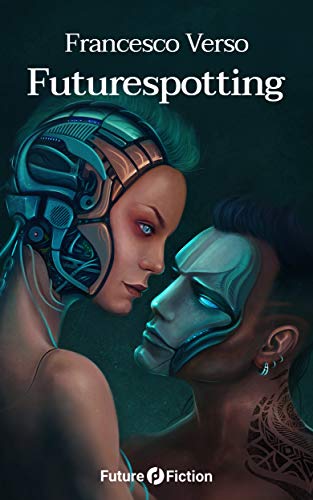
various translators
Future Fiction
March 21, 2021
194 pages
“Fernando Morales, This is Your Death!” tr. Sally McCorry
“Midsummer Future,” tr. Sally McCorry
“Italianskij Tikaj Tikaj,” tr. Tom Crosshill
“90 Cents,” tr. Sally McCorry
“Flush,” tr. Georgia Emma Gili
“The Green Ship,” tr. Michael Colbert
“Celestial Formatting,” tr. Georgia Emma Gili
“The Assassin’s Level,” tr. Sally McCorry
“Awakenings,” tr. Sarah Jane Webb
“AIdolon,” tr. Sarah Jane Webb
“Two Worlds,” tr. Sally McCorry
If you’ve read Francesco Verso’s work before, you know of his deep interest in transhumanism, whether through the interfacing of humans and machines, genetic engineering, or the results of evolution in the far future.
Of the eleven stories included in this collection, the majority deal with the ways in which humans interact with, and even inhabit, various forms of technology. “Fernando Morales, This is Your Death!” is the story of an old man lying his way onto a euthanasia reality show because he doesn’t want to die alone, while virtual reality is raised to a whole new “real” level in “Midsummer Future” and “The Assassins’ Level.” And while the former imagines a world in which only virtual sex is permitted, “Celestial Formatting” goes further by permitting us to read the thoughts of two people who have transmigrated via a computer program.
The two stories “AIdolon” and “Awakenings” fit perfectly into this collection, having first appeared in Words Without Borders a few years ago for a feature I guest-edited on Italian speculative microfiction in translation. In “AIdolon,” corpses from traffic accidents are “revived” by computer chips to work as accident-recovery personnel, while “Awakenings” imagines a crash victim waking up from a coma in a hospital only to find that her family “temporarily” replaced her with an android look-alike.
Verso is also interested in how discrete pieces of technology can alter humans’ interactions with one another. In “90 Cents,” a young woman visiting Milan stumbles upon a criminal gang that exploits children by putting LED trackers into their necks and then sending them out to commit crimes. Illegal ear buds are the focus of “Flush,” where a city has become so disturbingly loud that one man is willing to risk punishment just to sample “pure” silence.
Three of the stories in Futurespotting focus on migration and the idea of “home.” Refugees from Africa are saved from downing by the eponymous Green Ship, which ultimately takes them to a new geological formation that becomes their new homeland. An Italian medic far from home, in “Italianskij Tikaj Tikaj,” escapes the brutal futuristic war into which he was drafted, eventually finding comfort in the home of a simple Ukrainian family. And in “Two Worlds” (my favorite story of the collection), two different post-human species work together to turn the Earth back from one that includes a few tall trees and one vast ocean to a planet with land masses.
Like much of Verso’s work, this collection takes current ethical and technological questions and debates and turns them into highly-original narratives that make us think carefully about the kind of future we want.

1 comment on “Review: Futurespotting by Francesco Verso”